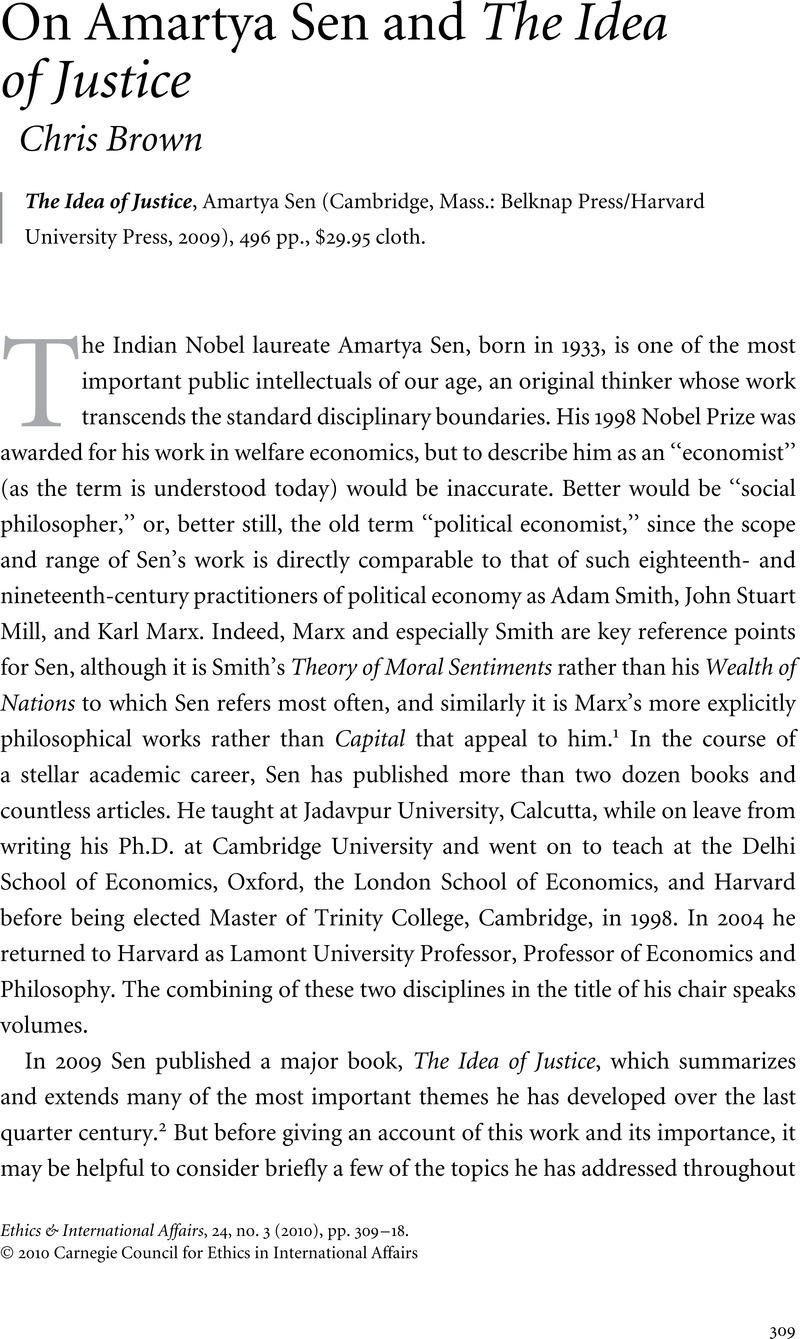Article contents
On Amartya Sen and The Idea of Justice
Published online by Cambridge University Press: 14 April 2011
Abstract

- Type
- Review Essays
- Information
- Copyright
- Copyright © Carnegie Council for Ethics in International Affairs 2010
References
NOTES
1 Smith, Adam, An Inquiry into the Nature and Causes of the Wealth of Nations (London: Penguin Classics, 1999)Google Scholar; and Smith, Adam, The Theory of Moral Sentiments, with an introduction by Amartya Sen (London: Penguin Classics, 2009).Google Scholar
2 Sen, Amartya, The Idea of Justice (Cambridge, Mass.: Belknap Press of Harvard University Press, 2009).Google Scholar Page references in this article are to this book.
3 Sen, Amartya, Poverty and Famines (New York: Oxford University Press, 1983)CrossRefGoogle Scholar; and Amartya Sen, Development as Freedom (New York: Anchor, 2000).
4 Sen, Amartya, “More Than 100 Million Women Are Missing,” New York Review of Books 37, no. 20, December 20, 1990.Google Scholar
5 Sen, Amartya, The Argumentative Indian (New York: Farrar, Straus & Giroux, 2005).Google Scholar
6 Rawls, John, A Theory of Justice (Cambridge, Mass.: Belknap Press of Harvard University Press, [1970] 2005).Google Scholar
7 See Rawls, John, Political Liberalism, 2nd rev. ed. (New York: Columbia University Press, 1996)Google Scholar, which represents a quite substantial shift in his thinking. Oversimplifying somewhat, instead of there being simply one notion of justice, the liberal notion, Rawls now sees justice as being the product of an overlapping consensus between reasonable metaphysical positions.
8 Rawls, John, The Law of Peoples (Cambridge, Mass.: Harvard University Press, 1999).Google Scholar Rawls's international theory is discussed in Chris Brown, “John Rawls, The Law of Peoples and International Political Theory,” Ethics & International Affairs 14 (2000), pp. 125–33.
9 Beitz, Charles, Political Theory and International Relations, rev. ed. (Princeton, N.J.: Princeton University Press, 1999)Google Scholar; and Thomas Pogge, Realizing Rawls (Ithaca, N.Y.: Cornell University Press, 1989).
10 A utilitarian would argue that the greatest happiness would come from listening to the flute in the hands of an expert, while an Aristotelian would argue that it was the telos of the flute, its purpose, to be played as expertly as possible.
11 “The problem of organizing a state, however hard it may seem, can be solved even for a race of devils, if only they are intelligent,” Immanuel Kant, First Supplement of the Guarantee for Perpetual Peace, in H. S. Reiss, ed., Kant: Political Writings (Cambridge: Cambridge University Press, 1970), p. 109. Of course, for Kant right intention is everything, so the devils would not actually be just even though the laws forced them to behave justly.
12 Pogge, Thomas, World Politics and Human Rights: Cosmopolitan Responsibilities and Reforms (Cambridge: Polity Press, 2002)Google Scholar, esp. chap. 6; and Thomas Nagel, “The Problem of Global Justice,” Philosophy & Public Affairs 33, no. 2 (2005), pp. 113–47.
13 As well as Smith et al., Sen might have drawn attention here to sixteenth-century humanists, such as Montaigne, or, for that matter, Shakespeare, whose nyaya approach to social life was replaced in the troubled seventeenth century by such practitioners of niti as René Descartes and Thomas Hobbes; Stephen Toulmin's Cosmopolis: The Hidden Agenda of Modernity (Chicago: University of Chicago Press, 1990) is an important study of this shift in European consciousness.
14 See Smith, Theory of Moral Sentiments, pt. III, chap. 1.
15 Sen, Amartya, “Rational Fools: A Critique of the Behavioural Foundations of Economic Theory,” Philosophy & Public Affairs 6, no. 4 (1977), pp. 317–44.Google Scholar
16 Development as Freedom is an important text here; also Amartya Sen and Martha Nussbaum, eds., The Quality of Life (Oxford: Clarendon Press, 1993).
17 Gotoh, Reiko and Dumouchel, Paul, eds., Against Injustice: The New Economics of Amartya Sen (New York: Cambridge University Press, 2009).CrossRefGoogle Scholar With essays on neorepublicanism by Philip Pettit and gender justice by Martha Nussbaum, as well as studies on capabilities and reasoning, this collection ranges more widely than the reference to economics in the title would suggest.
- 13
- Cited by




